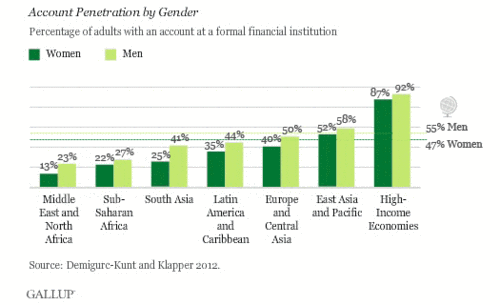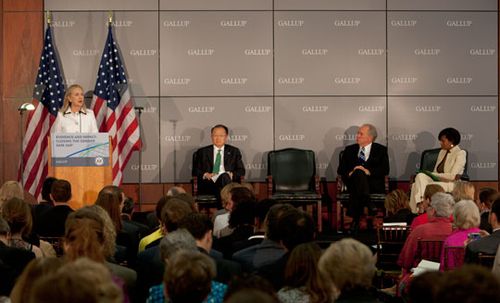
I just received a Gallup report for the World Bank about gender differences in bank account usage.
The headline is that gender barriers exist worldwide to banking.
Hmmm … women are less included in finance than men.
Hmmm … my initial reaction was so what?
No, I’m no misogynist, but it doesn’t surprise me that women are less included in that, in the majority of nations, men are more likely to be the worker still.
Hence, as the work horse, the man is more likely to have the bank account, although the woman is more likely to control how it is used.
And this does turn out to be the case, as the reason for women not having bank accounts is mainlyu because another member of the household has one.

Among all adults without an account, the most common reason cited for not having one was not having enough money to use an account. Among unbanked men, the next most commonly cited reason was that banks or accounts are too expensive. However, among unbanked women, the second most common reason (cited by 26%) is that another family member already has an account. For men, this reason ranks fourth (after too expensive and too far away).
In South Asia, where the overall gender gap in account penetration is largest, the gender gap in this response is 10 percentage points. This suggests that indirect use of accounts is widespread among women in the region -- reflecting a lack of asset ownership that may have implications for economic independence and self-employment opportunities.
What did surprise me is that half of this planet is unbanked with, on average, 55% of men and 47% of women having a relationship with a formal financial institution.

The whole point being that we need more inclusion which, as I recently blogged, will happen as a result of mobile ubiquity.
That’s certainly the belief of Secretary of State Hillary Clinton who commissioned the research through the Department of State.

“As we have learned in this country, what gets measured gets done. Once you start measuring problems, people are more inclined to take action to fix them because nobody wants to end up at the bottom of a list of rankings.”
Aha. So, by knowing what progress has been made you can move things forward.
As Secretary Clinton goes on to say: “Data not only measures progress, it inspires it.”
So true and yet so undervalued is data by many that they just throw it away, especially banks (as I’ve blogged regularly).
As Secretary Clinton concludes: “Data only becomes valuable when it is organised and put to work.”
I think I get that message.
Maybe the banks should, not only to increase share of wallet in the developed world but also to recognise that with half of the world unbanked, there’s a great opportunity for growth.
These results come from a global study of financial inclusion, which measures how adults in 148 economies save, borrow, make payments, and manage risk. Gallup collected the data in 2011 for the World Bank Global Financial Inclusion (Global Findex) database, which is funded by the Bill & Melinda Gates Foundation. The database is the first source of hard data for examining how women make financial transactions, both inside and outside the formal financial sector.
The complete database and related report, along with the survey in 15 languages, are available at http://www.worldbank.org/globalfindex.
Access the complete country-level data set, report, and questionnaire at www.worldbank.org/globalfindex.
Chris M Skinner
Chris Skinner is best known as an independent commentator on the financial markets through his blog, TheFinanser.com, as author of the bestselling book Digital Bank, and Chair of the European networking forum the Financial Services Club. He has been voted one of the most influential people in banking by The Financial Brand (as well as one of the best blogs), a FinTech Titan (Next Bank), one of the Fintech Leaders you need to follow (City AM, Deluxe and Jax Finance), as well as one of the Top 40 most influential people in financial technology by the Wall Street Journal's Financial News. To learn more click here...

